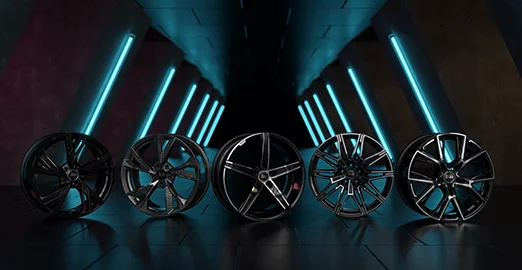Which is better?
When you buy new tires for your car, you also have to choose a type of rim: aluminium or steel.
Both have their advantages and disadvantages that you should weigh up depending on your needs and your budget.
In this blog post, we will explain the main differences between aluminium and steel wheels and help you make the best choice for your car.
WHAT ARE ALUMINIUM AND STEEL RIMS?
Rims are the round metal parts to which the tires are attached. They affect the appearance, weight, handling and safety of your car. Rims can be made from a variety of materials, but the most common are aluminium (alu) and steel.
Aluminium wheels are made from an aluminium alloy that is cast into shape. They are lighter, more flexible and better at conducting heat than steel wheels. They are available in a wide range of designs, colours and sizes. They are usually more expensive than steel wheels.
Steel rims are made from rolled steel sheet bent into a ring. They are heavier, stronger and more resistant to rust than aluminium wheels. They have a simpler and simpler appearance. They are usually less expensive than aluminium wheels.
WHAT ARE THE ADVANTAGES OF ALUMINIUM RIMS?
Aluminium rims have a number of advantages over steel rims that you should consider:
- Appearance: Aluminium wheels usually look more attractive and modern than steel wheels. They can give your car a sporty or elegant touch. You can choose from a variety of shapes, patterns and colours to suit your taste and car type.
- Weight: Aluminium wheels are significantly lighter than steel wheels. This means that they reduce the unsprung mass of your car, i.e. the weight that is not carried by the suspension. This improves your car’s handling, acceleration, braking and fuel consumption.
- Heat dissipation: Aluminium rims have a higher thermal conductivity than steel rims. This means they dissipate heat from the brakes more quickly. This prevents the brakes from overheating and increases their life and efficiency.
- Ride comfort: Aluminium wheels are more flexible than steel wheels. This means they adapt better to bumps in the road. This increases suspension comfort and reduces vibration in the car.
WHAT ARE THE DISADVANTAGES OF ALUMINIUM RIMS?
Aluminium rims also have some disadvantages compared to steel rims that you should consider:
- Price: Aluminium wheels are usually more expensive than steel wheels. This is due to the higher cost of production and the higher value of the material. You may also need to buy special tires or bolts for your aluminium wheels.
- Sensitivity: Aluminium rims are more vulnerable than steel rims. They can easily get scratches, dents or cracks when you hit curbs or potholes. This can affect the appearance and safety of your rims.
- Corrosion: Steel rims are better protected against rust than aluminum rims. This is because they are coated with a special coating that isolates them from moisture, salt or chemicals. This prevents oxidation and peeling of the paint.
WHAT ARE THE DISADVANTAGES OF STEEL RIMS?
Steel rims also have some disadvantages over aluminum rims that you should consider:
- Appearance: Steel rims usually look more boring and outdated than aluminum rims. They have a simple and plain design that gives little character to your car. You can use hubcaps to improve the appearance, but they can easily fall off or be stolen.
- Weight: Steel rims are significantly heavier than aluminum rims. This means that they increase the unsprung mass of your car, i.e. the weight that is not carried by the suspension. This worsens the driving behavior, acceleration, braking performance and fuel consumption of your car.
- Heat dissipation: Steel rims have a lower heat conductivity than aluminum rims. This means that they dissipate the heat from the brakes slower. This can lead to overheating of the brakes and a decrease in their lifespan and efficiency.
- Suspension comfort: Steel rims are stiffer than aluminum rims. This means that they adapt less well to the bumps in the road. This reduces the suspension comfort and increases the vibrations in the car.
CONCLUSION
Aluminum or steel rims – which is better? This question cannot be answered generally, as both types of rims have their advantages and disadvantages. You have to consider your personal preferences, your budget and your vehicle to make the best decision for your car.
Aluminum rims are usually more aesthetically pleasing, lighter, more flexible and more heat-conductive than steel rims. They offer a better driving dynamics, lower fuel consumption and higher suspension comfort. They are however also more expensive, more sensitive and more prone to corrosion than steel rims.
Steel rims are usually cheaper, more robust and more rust-resistant than aluminum rims. They offer a higher safety and a longer lifespan. They are however also more boring, heavier, stiffer and less heat-dissipating than aluminum rims. If you are not sure which type of rims is suitable for your car, you can ask for advice from a professional or compare online.







